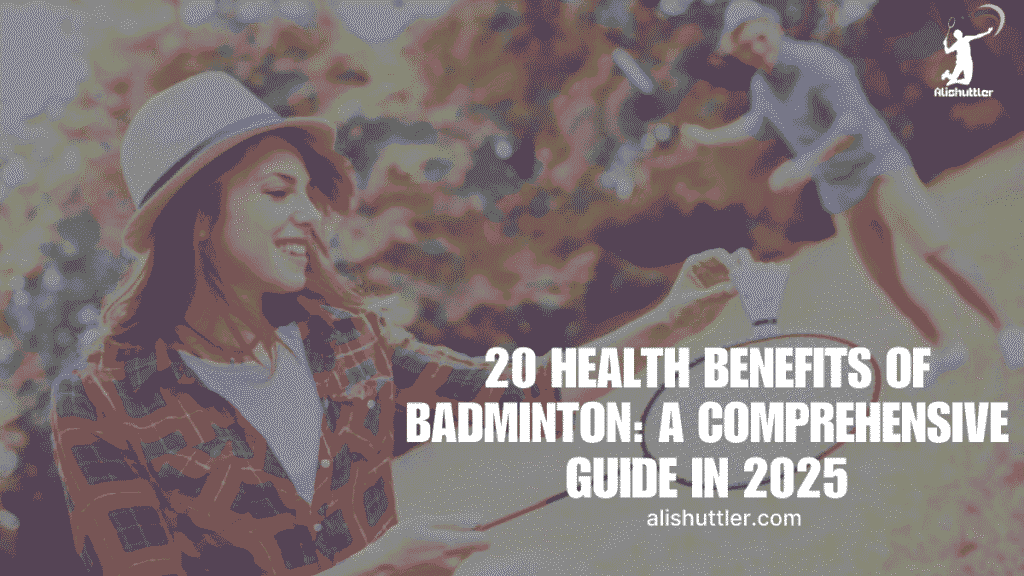Health benefits of badminton include improved heart health, enhanced muscle strength, and greater balance.
Badminton can help burn calories, build endurance, and boost mental focus. Anyone, regardless of age or ability level can participate the game is simple to pick up and requires minimal equipment.

Some play for fun, but consistent matches can reduce stress and maintain a healthy weight. Additional information on these health benefits is discussed below in the main article.
Why Badminton?
Badminton shines as a sport that provides holistic health benefits, from physical to mental and social well-being. Its gameplay incorporates short bursts of movement, strategy and socializing, making it an excellent all-around option for those looking for an efficient way to bolster long-term health.
1. Cardiovascular Health
Badminton heart rates raced during rallies, and it was an effective aerobic workout. These intense bursts make the heart push harder, which supports cardiovascular fitness. The game encourages healthy blood flow – which helps keep your heart muscle strong and reduces your chances of cardiovascular disease.
Even brief, consistent sessions can keep your heart healthy and build your endurance with time. For instance, research records that adult female badminton players have a reduced resting heart rate and can endure longer periods of activity.
Unlike certain workouts, badminton doesn’t FEEL like a chore, but more like play, which can make it easier to maintain your aerobic exercising for years.
2. Muscle Strength
These constant starts, stops and jumps in badminton engage many different muscle groups simultaneously. Legs, arms, back and core are all called into action with lunges, smashes and rapid changes of direction.
Upper body strength increases with every serve and stroke, while core stability is developed by remaining balanced on the court. Badminton training impacts muscle endurance as well, since rallies can go on for minutes at a time and keep players on their feet the entire time.
Gradually, this results in improved muscle coordination and control, which can be beneficial in other sports or everyday activities.
3. Bone Density
Badminton is a weight bearing activity, so it makes bones stronger – bones love stress. It combines quick jumps, fast turns, and short sprints, all of which apply healthy stress to bones.
This stress tells the body to generate additional bone, thereby helping to decelerate age-related bone loss and reduce the risk of osteoporosis. Daily play staves off bone fractures as you get older.
By promoting joint health and flexibility, badminton keeps individuals agile and active without overexerting the body.
4. Mental Agility
Fast gameplay implies split-second decision making for players. Watching the shuttlecock, reading your opponent, and deciding which shot to make all necessitate quick thinking.
This contributes to enhancing cognitive skills and keeping the mind sharp. Concentration rules at badminton. Players must focus, react to the unexpected, and problem solve on the fly.
Over time, these mind workouts can help alleviate stress, calm depression and anxiety, and activate positive hormones, leaving players feeling more alive and engaged.
5. Social Connection
Because badminton is usually a group or doubles sport, it encourages powerful social connections. Whether it’s joining a club or going to local games, it can assist people in finding new friends and feel part of a community.
Doubles matches impart lessons in teamwork and good communication, developing skills that translate well to other arenas of life. These social connections can enhance well-being and provide a feeling of community.
Shared victories, friendly rivalry and collective training make it a joyous and fulfilling sport. This sense of connection may encourage adherence to exercise, which in turn can reduce the risk of premature death by 20-30%.
Physical Gains
Badminton combines aerobic and anaerobic activity, making it a convenient option for individuals seeking to maintain physical fitness. The game appeals to many different ages and fitness levels, and it’s been accredited for its calorie-burning, metabolic-enhancing, reflex-sharpening effects.
Research indicates that engaging in badminton allows individuals to live longer, enhances their physical gains, and remain active well into advanced age.
Weight Management
- Schedule your play weekly – shoot for a minimum of three 60 minute sessions.
- Log weight and body measurements every two weeks to track progress.
- Log calories burned per session with a wearable or app.
- Establish game-oriented goals such as rally length, footwork steps, or match wins.
- Track energy and sleep, as improved rest can accelerate gains.
Badminton can fill the void for those of you who find the gym rut to be boring. The fast play and social aspect encourages people to persist with it longer than many solo workouts.
Even casual players can witness major improvements. Plenty drop up to 4 kgs in a month with consistent play and eating right. This renders it a potent selection for weight management.
Metabolic Rate
High-energy badminton games get the heart rate up and keep you moving, which can boost your metabolism. The game’s combination of sprints, lunges and jumps works big muscle groups, resulting in higher energy expenditure during and after play.
Incorporating badminton into a workout regime can assist your body in burning calories even while resting. This is the infamous “afterburn effect,” the body continues to burn fuel after exercise.
Standard, consistent playing over time can help undergird improved metabolic health. It can reduce the risk of diabetes as much as 58% and assist with long-term weight control.
Badminton is handy for those looking to achieve fitness goals associated with their metabolism—such as shedding body fat or boosting energy.
Reflexes
- Shadow footwork with emphasis on directional changes.
- Multishuttle drills to build reaction speed.
- Net kill practice to sharpen hand-eye coordination.
- Partner feeds random shots to test split-second decisions.
Badminton play translates to reacting to high shuttle speeds and blistering swings. This increases reflexes and hand-eye coordination over time.
Drilling other strokes, such as smashes or drop shots, gets the brain and body to coordinate more quickly. This aids other areas of life requiring quick thinking and nimble action.
Agility and speed stem from short sprints and sudden stops, which are prevalent in every game. This training builds strong muscles and bones and reduces the risk of fractures down the line.
Mental Wellness
Badminton bolsters mental wellness by combining physical activity, social interaction, and tactical gameplay. Playing this sport can help people find knee-bending relief from daily tension, reinvigorate pep in the step and keep the mind more sharp. This mix of aerobic, social and mental activities makes badminton a comprehensive method for nurturing mental wellness.
Numerous studies validate what we know intuitively — that consistent play can reduce your risk of depression or anxiety, and provide a healthy outlet for stress.
Stress Reduction
- Pick a regular time each week for play to establish routine.
- Focus on your breathing and footwork during rallies.
- Play with friends or a club for social support.
- Use warm-ups and cool-downs to bookend ‘me time’.
- Avoid screens or outside distractions while on the court.
- Reflect after matches on positive moments, not just results.
A game of badminton tends to make one feel better naturally. The body releases endorphins, or “feel-good” hormones, that help relieve anxiety and stress during play. Over time, this impact can cultivate a more positive outlook and emotional equilibrium.
As is the case with most sports, players report that concentrating on the shuttle and court is an effective way to escape daily concerns, serving as a type of mindfulness. Players can abandon stress as they time each shot, strategize their next move and respond to what’s going on the court.
Regular play creates resiliency. Adhering to a consistent match or friendly game schedule has been demonstrated to reduce depression symptoms by as much as 40% in certain research. This routine exercise, which among other things trains body and mind to better manage stress, makes it easier to return from rough days.
Cognitive Function
Badminton requires more than muscle. All of these require you to think on your feet, make rapid decisions, and analyze your opponent’s behaviors — just like a good rally. This keeps the mind active. Over time, this type of strategic play hones memory and attention.
Weekly matches and drills can enhance attention span and help you focus on off-court tasks. When to plan shots, when to change tactics, when to adjust to new game situations keeps the mind flexible and alert.
Just as people who play at least 10–20 minutes per week exhibit improved cognition, even from a single session. For seniors, this can translate to enhanced memory and reduced risk of dementia.
In a separate study, six months of aerobic activity was more beneficial to early Alzheimer’s patients than other variety of exercise. Badminton is social as well. Forging connections with partners or teammates aids mental wellness.
Learning to collaborate with peers, adjust to change and regulate frustration are all skills that flourish with frequent play.
Badminton vs. Gym

Badminton and gym workouts are both popular choices for staying fit, yet each offers a different experience and set of benefits. Just like the rest of the world, they evaluate each’s advantages and disadvantages, not only for health but for lifestyle compatibility with hectic schedules.
Here’s a table that provides a clear glance at how the two stack up in critical areas.
| Benefit | Badminton | Gym Workouts |
|---|---|---|
| Cardiovascular Health | High, with fast-paced play and quick moves | Varies, depends on activity choice |
| Calorie Burn | Up to 480 kcal/hour | 300–600 kcal/hour (activity-dependent) |
| Social Interaction | High, usually played with others | Usually solo, can join group classes |
| Motor Skills | Boosts reflexes, hand-eye coordination | Some activities help, less focus |
| Enjoyment | Often seen as more fun and engaging | Can be repetitive for some |
| Stress Relief | Good, encourages focus and reduces tension | Good, but can be less engaging |
| Sleep Quality | Promotes easy sleep after gameplay | Can help, varies by workout intensity |
| Accessibility | Needs a court and equipment | Needs gym access, often nearby |
Badminton scores on its robust social component. Instead of solo gym sessions, it’s a communal sport, cultivating camaraderie. Players need to collaborate with partners, learn to anticipate each other’s movements, and develop trust.
This social element turns every session into more than just a sweat-sesh it becomes a shared experience. For most, this boosts mood and maintains return, which aids habit formation. True, most gyms provide group classes, but a lot of gym routines are lone wolf—something that can start to feel not so fun or even tedious.
From a fitness perspective, badminton provides a full-body workout that increases cardiovascular health, agility, and endurance. It demands rapid footwork, fast responses and intense concentration, aiding the development of reflexes and fine motor coordination.
An hour of play can burn a lot of energy–as much as 480 calories, nearly as much as many gym activities. This rapid pace gets the heart going, similar to running or biking, but adds the advantage of continuous movement and rapid shifts in direction. This keeps both body and mind agile.
Badminton beats old-school gym workouts. There’s variety in every match, and the game’s pace keeps players involved, not bored. This back and forth keeps it fresh, as opposed to some gym workouts that cycle through the same moves.
This helps people stay with badminton for the long term. After a hard-fought match, players are exhausted in a healthy sense. This establishes a healthier sleep routine and allows the body to sleep. The concentration required for play can shove stress aside, helping you unwind and reduce anxiety.
Nevertheless, there are considerations to balance. Locating a decent badminton court is crucial that can be difficult in certain locations. Meanwhile, gyms are usually nearby or open late, so they’re easy to squeeze into nearly any schedule.
Well, travel time, such as the two hours some dedicate to get to the gym in addition to long days at work, can be significant. For these individuals, a local badminton court or 24-hour gym can tip the scales.
Common Misconceptions
Badminton is a misunderstood sport. A lot of people miss how it benefits body and mind, or they might view it as a kids’ game or a hobby. In reality, badminton is far more than a backyard pastime, and its advantages extend to a broader group of individuals than you’d anticipate.
| Misconception | Fact |
|---|---|
| Badminton is low-intensity | It is marked by high bursts of speed and quick stops, offering a strong workout. |
| Only good for physical health | Research shows mental and social gains, like less stress and better focus. |
| Only for young people | Studies show gains for any age, including older adults, like better balance and strength. |
| Needs high fitness to play | All fitness levels can join, and players can set their own pace. |
| Solo sport | Mostly played with others, often doubles, helping social skills and teamwork. |
| Not as good for heart health as other sports | Offers big gains for heart fitness, similar to running or swimming. |
| Only played in Asia | Played in many countries, with clubs and leagues worldwide. |
| Badminton strings last forever | Strings wear out and should be changed about every four years. |
Badminton is notable for its intensity and stop-and-go style. It’s not simply a serene game with a shuttlecock. They sprint, leap and respond quickly, which exercises the heart, lungs, and a lot of muscles.
Other research even discovered a one hour session can torch as many calories as jogging. Fast feet and arm swings employ both large and small muscle groups, assisted with strength and balance.
This game does more than just make you physically healthier. It can assist in mind sharpening, stress reduction, and mood enhancement. The game frequently goes at a rapid rate, requiring keen attention and swift decisions.
This cognitive exercise, coupled with the social components of playing with others, unites individuals and can combat loneliness or depression. Because many clubs and community centers offer badminton, it’s a good way to meet new people and build social ties.
Badminton is open to all ages and skill levels. Children, adults and seniors can all play where it suits them. The court can be full-size or abbreviated and games can be either singles or doubles.
That means that folks of varying fitness levels, even non-athletes, can participate. It’s a game as simple or as difficult as you require, making it both inclusive and demanding.
The Unseen Advantage
Badminton combines a unique blend of physical, mental and social benefits that distinguishes it from most other pursuits. It’s not simply about returning a shuttle. The game demands quick steps, rapid reflexes and intense concentration, all while remaining nimble.
Accordingly, badminton players experience enhanced fitness, clearer cognition, and denser social connections.
Physically, badminton exercises several muscles simultaneously. These short sprints and jumps build strong legs and improve heart health. The side swings and reaches tone and shape arms as well as shoulders.
Frequent players, even just a few times a week, could experience better balance and stronger bones. This is crucial for adults because it translates to fewer bone fractures or falls when they grow older. One famous study even concluded that badminton players can live up to 6.2 years longer than inactive people.
That’s not just good news for athletes, it demonstrates how a humble racket sport can help the rest of us outlive our life expectancy and feel better in the process.
Mental advantages differentiate. Badminton is quick, so you need to think on your feet. Every such game develops presence of mind, which can cascade into everyday life, helping you maintain edge at work or school.
It’s a natural stress buster. A few matches can reduce stress hormones and increase happy hormones, leaving players feeling lighter and more buoyant. Other studies have revealed that badminton can reduce symptoms of anxiety and depression.
Although more research is required, the preliminary indications are robust and suggest actual mental benefits.
Badminton is a sociable sport. Played in your club, at school, or your local park, it allows you to form new connections and maintain existing ones. Whether you’re working together in doubles or you’re cheering each other on, it builds trust and it brings people closer.
These connections can result in improved social health and increased well-being. Being part of a community or a team provides numerous individuals both meaning and camaraderie something as essential to health as any fitness regimen.

What sustains badminton as a hobby is its sheer fun. Its fast paced, keeps you active, and is for all ages. That is, it’s easy to adhere to, which is a large part of the reason why it’s so effective for long-term health.
Final Thoughts on the Health benefits of badminton
Badminton is unique in its ability to generate real gains you can feel. You exercise, sweat and enjoy yourself. Muscles become strong, lungs become full of fresh air and stress is reduced. It doesn’t require fancy equipment or large membership fees. Anyone can play regardless of skill or age. Gym trips get stale, but a quick game keeps you nimble and alert.
My friends chuckle and chat more following every game. Health seems effortless when it integrates with your lifestyle. Because sometimes, all it takes to ignite transformation is to grab a racket, join a local club, or even smash a few shuttles with friends. Please give it a whirl and observe what moves, both mental and physical. Let’s play, lead the way.
Frequently Asked Questions
What are the main health benefits of playing badminton?
Badminton boosts cardiovascular health, muscle strength, flexibility and coordination. It burns calories and promotes weight control.
Is badminton good for mental wellness?
Indeed, badminton can alleviate stress and anxiety. It boosts mood via endorphin release and aids concentration and mental acuity.
How does badminton compare to gym workouts for fitness?
Badminton mixes cardio with agility and reflex training. Unlike certain spin or box classes at the gym, it provides whole body movement and social interaction, which make working out more fun.
Can beginners benefit from playing badminton?
Indeed. Badminton is for every skill level. Even beginners improve fitness, coordination, and confidence playing regularly.
Does badminton help with weight loss?
Yes, badminton totally torches calories. An average match can burn 300–500 calories an hour, promoting weight loss.
Are there any common misconceptions about badminton?
A lot of people think that badminton is a simple or slow sport but it is, in reality, a fast paced and physically demanding sport. It demands power, lightning reflexes and stamina.
What is a unique advantage of playing badminton?
Anyone can play badminton. You can play it indoors or outdoors with hardly any equipment or space.






